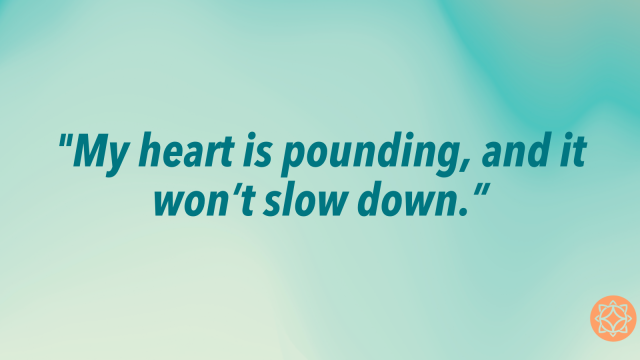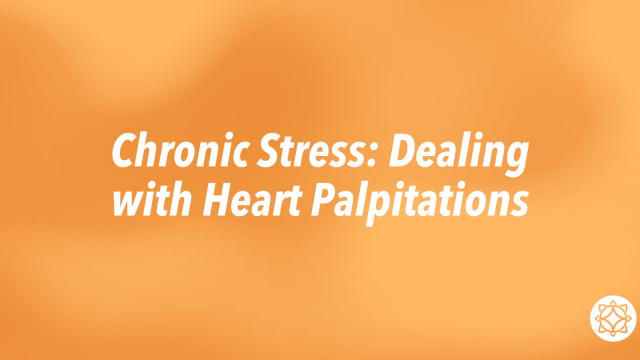Chronic Stress: Dealing with Heart Palpitations
By Lara Schuster Effland

“My heart is running a 100-meter dash.”
“My heart flip flops.”
“My heart is pounding, and it won’t slow down.”
These words are commonly said by my patients with anxiety.
When our hearts start doing funny things, it can feel scary and may even cause panic. We may fear a heart attack or that we have heart problems.
Here is what might be happening, though: our bodies may be responding to current stressful situations in our lives, creating more adrenaline and cortisol to prepare us for action. This is known as the fight or flight response. The fight or flight response is an automatic process within our central nervous system, specifically in our brain. This response leads to increases in our heart rate when we feel anxious or overwhelmed. And, when our heart races, it makes us feel even more anxious and overwhelmed.
How can you know if your heart is racing because of anxiety?
Often, when heart palpitations or a “racing heart” are caused by stress or anxiety, they are harmless. So, when should you be concerned if your heart is racing? Let us look at what the research has shown.
- At least one study has shown that less than half of those with heart palpitations had heart disease.
- One-third of the remaining cases were due to psychological causes, such as anxiety.
- No cause was found in 16 percent.
- The rest of the cases were triggered by thyroid overactivity, anemia, and drug ingestion, including caffeine.[1]
How to stop heart palpitations due to anxiety
When you feel stressed and have a racing heart, it is best to try stress-reducing activities to help communicate to your body that it is time to calm down. Options include:
- Meditating
- Walking
- Exercising
- Knitting and other hobbies
Try anything that exerts some type of energy to use up the stress hormones, while also relaxing the mind. The brain and body connection is very powerful. These activities help the activated part of our brain physically calm down our body.
Heart palpitations: When to worry
If you are concerned about heart palpitations, it is important to consider the setting.
- Have you been under stress lately?
- Are you worried about something?
If you are experiencing heart palpitations regularly, or are concerned about ongoing heart issues, please call your doctor. Ask your doctor to offer suggestions as to what might help reduce heart palpitations, particularly if they are making you even more anxious.
No matter what, we encourage you to make sure that you are taking care of yourself and reducing your overall stress level. To help you out, we have compiled a list of ways to practice self-care to reduce stress. Reducing stress and practicing regular self-care may help to reduce the frequency of heart palpitations.
Find self-care activities to reduce stress here.
In summary, if you are concerned about heart palpitations or heart flutters, please see your doctor. And remember to practice relaxation activities and self-care regularly.

Eating Recovery Center and Pathlight Mood & Anxiety Center provide evidence-based treatment at all levels of care for eating disorders and mood and anxiety disorders, including trauma-related disorders. To learn more about treatment, call us at 866-622-5914 or fill out this form:
Contact a member of our team now.
Read These Next:
- Self-Care Activities to Reduce Stress
- Do You Have Anxiety? Take the Quiz
- All About Anxiety: An Overview
Source:
Learn about World Mental Health Day
This blog was written for World Mental Health Day. World Mental Health Day, sponsored by the World Health Organization (WHO), aims to raise awareness of mental health issues worldwide and mobilize efforts to support mental health. Did you know?
- Half of all people with mental illness will show signs before the age of 14. Sadly, most of these individuals will not be identified as having a health problem. No treatment will be provided.
- Drug and alcohol use among adolescents is prevalent in many countries. This is highly risky behavior as it can lead to unsafe sex and impulsive, dangerous driving.
- In those between the ages of 15 and 29, suicide is the second leading cause of death.
Drug/alcohol use and suicide are signs of mental health issues. Treatment and intervention for these issues is available and can be highly effective. It is never too late to admit that you need help. It is never too late to make a phone call to a therapist, a crisis hotline or even a friend. It is never too late to make a change.
We offer these resources to you, to help you give yourself or a loved one a better experience in this life.
- To speak confidentially with one of our Master’s-level counselors about treatment options for mental health issues, please call us at 1-866-622-5914.
- If you are facing a life-threatening emergency, please call 988: the Suicide and Crisis Lifeline.
The call you make may save a life.
Written by Lara Schuster Effland, LICSW, CEDS-S, licensed clinical social worker and certified eating disorder specialist/supervisor.
Clinically reviewed by Allison Chase, PhD, CEDS-S, clinical psychologist, regional clinical director for Eating Recovery Center and Pathlight Mood & Anxiety Center in the Texas Region, and certified eating disorder specialist/supervisor, on May 22, 2023.
Struggling with your mental health?
One conversation can make all the difference. Connect with us today.
Get Help NowConnect With Us



